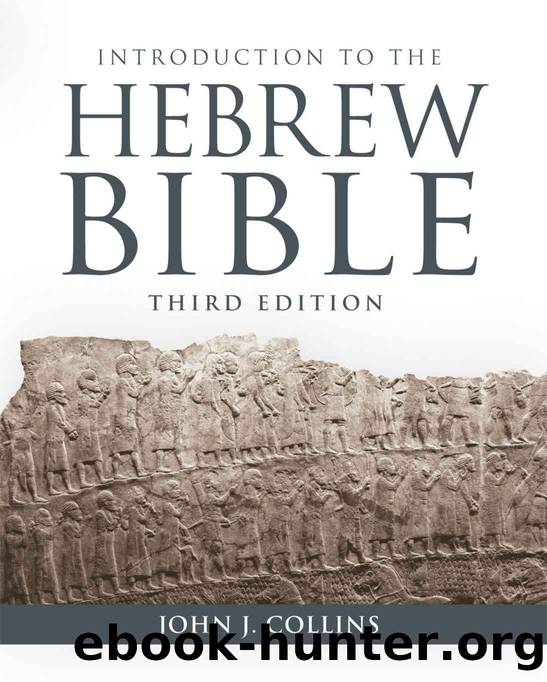Introduction to the Hebrew Bible: Third Edition by John J. Collins

Author:John J. Collins
Language: eng
Format: azw3
ISBN: 9781506446059
Publisher: Fortress Press
Published: 2018-04-14T22:00:00+00:00
Unlike the vision of Micaiah, that of Isaiah is set in the Jerusalem temple, where YHWH was believed to be enthroned above the cherubim (cf. Isa 37:16). Micaiah had seen the host of heaven. Isaiah sees “YHWH of hosts,” one of his favorite designations for God. The seraphim are “burning ones,” representatives of the host in attendance on YHWH. The composition of this host would become a subject of great fascination in later apocalyptic and mystical literature. There are many depictions of winged creatures in Near Eastern art, often with bodies in animal or even human form. Isaiah 14:29 and 30:6 speak of “flying seraphim” in a context that suggests that they are a kind of serpent. In Num 21:6-9 the word is used with reference both to poisonous snakes and to the bronze serpent (Nehushtan) made by Moses. In the time of Isaiah, Nehushtan was still preserved in the temple, and this may have given rise to the idea that seraphim attended the divine throne. Here the seraphim proclaim the holiness of God in a form that influenced the liturgical traditions of both Judaism (the qedushah) and Christianity (the trishagion or sanctus). God is often called “the Holy One of Israel” in Isaiah, in all sections of the book.
The implications of the holiness of God become clear in the following verses. Isaiah confesses that he is a man of unclean lips, living among an unclean people, and so he is unworthy to see the Lord. It is not apparent that Isaiah is guilty of any specific violation. Rather, the point is that any human being is impure in relation to God. The gulf between the Holy One and humanity is one of the key themes of Isaiah’s prophecy. Isaiah is purified, but at a cost. His lips are touched with a burning coal (suggested by the burning of incense in the temple). The implication is that the human condition can only be purified by the painful and radical remedy of burning. This will have implications for the fate of the people of Judah.
The discussion in the divine council is rather similar to what was reported by Micaiah ben Imlah. The Lord asks for a volunteer to do his bidding. In this case, unlike that of Micaiah, the prophet volunteers. He is given a strange message to convey:
Keep listening, but do not comprehend;
keep looking, but do not understand.
Make the mind of this people dull,
and stop their ears, and shut their eyes,
so that they may not look with their eyes,
and listen with their ears,
and comprehend with their minds,
and turn and be healed.
Download
This site does not store any files on its server. We only index and link to content provided by other sites. Please contact the content providers to delete copyright contents if any and email us, we'll remove relevant links or contents immediately.
The Five People You Meet in Heaven by Mitch Albom(3569)
The Secret Power of Speaking God's Word by Joyce Meyer(3223)
Real Sex by Lauren F. Winner(3024)
Name Book, The: Over 10,000 Names--Their Meanings, Origins, and Spiritual Significance by Astoria Dorothy(2987)
The Holy Spirit by Billy Graham(2953)
0041152001443424520 .pdf by Unknown(2846)
How The Mind Works by Steven Pinker(2816)
ESV Study Bible by Crossway(2778)
Ancient Worlds by Michael Scott(2690)
Churchill by Paul Johnson(2587)
The Meaning of the Library by unknow(2573)
The ESV Study Bible by Crossway Bibles(2553)
The Gnostic Gospels by Pagels Elaine(2532)
MOSES THE EGYPTIAN by Jan Assmann(2417)
Jesus by Paul Johnson(2363)
City of Stairs by Robert Jackson Bennett(2355)
The Complete Dead Sea Scrolls in English (7th Edition) (Penguin Classics) by Geza Vermes(2284)
The Nativity by Geza Vermes(2233)
Ancient Near Eastern Thought and the Old Testament by John H. Walton(2226)
